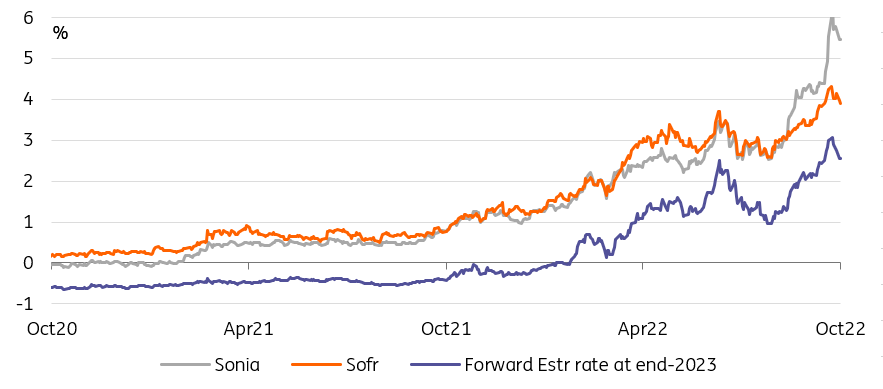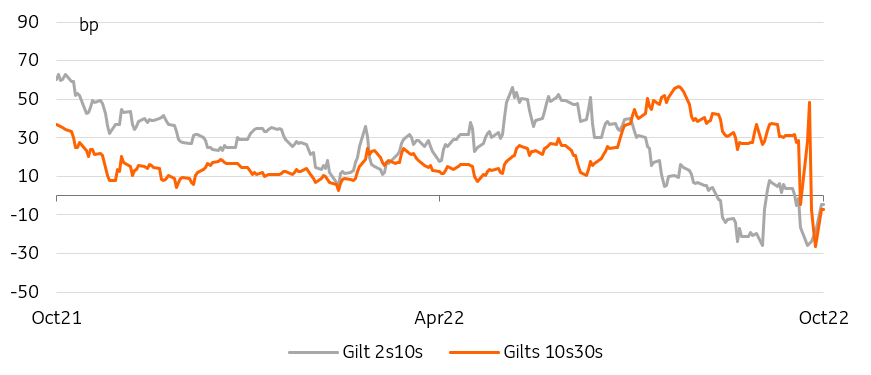Markets are smelling blood in the water, but do they have enough evidence to price a policy turnaround? Not yet in our view. The BoE’s reluctance to buy gilts is a sign that it hasn’t given up the fight against inflation
Markets on high alert for a central bank pivot
The sight of a bond rally when investors smell a whiff of a central bank pivot is something to behold. The root cause of the recent re-pricing lower in rates can be traced back to two factors: the global economic slowdown and resurgent fears for financial stability.
The former is nothing new, and investors were wrong-footed by a surprisingly resilient US economy as recently as August, lending credence to the hawkish tone of the Fed, and by extension for the Bank of England (BoE), and European Central Bank (ECB). The need for emergency BoE intervention in the gilt market last week has brought the latter to the fore. While most expected the dramatic jump in rates to translate into financial stress, the timing and location of the first crisis were difficult to predict with any degree of precision.
All this begs the question: is this really a turning point in central banks’ tightening cycles, or at least have tightening expectations gone far enough? Any answer to that question has to start with the Fed. There were signs last week that financial stress is starting to register in its consciousness, most notably with Lael Brainard’s speech on Friday, and with Thomas Barkin expressing concerns about the spillover of a stronger dollar yesterday.
Recent hopes of a pivot have been disappointed
Recent hopes of a pivot have been disappointed, however. Despite signs that a housing recession is already there, it is unclear whether economic circumstances have changed enough to prompt a policy change. Investors, however, may secretly be hoping for a slower pace of hikes going forward, or for Quantitative Tightening to be reconsidered. The RBA hiking only 25bp against a 50bp consensus overnight may well have reinforced these hopes.
Swaps have pared back hike expectations as financial stress spreads

BoE caution shows that the inflation fight isn’t over
A look at the UK can also be instructive, although the read-across to other central banks is admittedly more limited than for the Fed. Monday’s BoE long-end gilt buying operation only accepted anecdotal amount of offers amid the generalised bond rally.
Monday’s BoE long-end gilt buying operation only accepted anecdotal amount of offers
To us, this is a strong signal that it sees its intervention as a backstop against market volatility, rather than a quantitative target. The result? gilts were the only developed market sector that ended the day with higher yields than on Friday. At the very least, this suggests that the central bank is wary of debt monetisation calls, or of the counterproductive effect of purchases in its fight against inflation. The fact that it will now request the identity of underlying sellers also indicates that it wants the program to remain targeted to pension funds.
The next few days might deliver additional information on how fast economies are slowing down or – more realistically – how widespread financial stress is. But, for the moment, we fear the bond rally is running short of tangible evidence of a change in monetary policy. Neither can the more than 20bp rally in Treasuries and Bund since Friday be attributed to safe-haven demand, given that stock indices ended the day up and credit indices tighter.
The gilt long-end steepened after more timid BoE purchases

There should be no let up in inflationary signals today with eurozone expected to jump another 4.9% month-on-month.
Austria kicks off this week’s euro government bond supply slate with auctions in the and 30-year sectors, followed by Germany selling inflation-linked bonds. Potentially more market moving, the UK’s Debt Management Office will sell £2.5bn of 2061 bonds, one day after the BoE decided to accept only £20mn out of the £1.9bn offered by dealers.
Monetary policy will never be far from the market’s mind. ECB speakers include president Christine Lagarde and Fabio Centeno. From the Fed, Lory Logan, Loretta Mester, John Williams, Phillip Jefferson, and Mary Daly make up today’s speakers list. Markets are on the hunt for signs of a central bank pivot, armed with a strong confirmation bias, so the bond rally may well extend, but we think it is increasingly on thin ice and vulnerable to another outpouring of hawkish comments.
The other data releases of note will be in the US session, with factory/ and .
Disclaimer: This publication has been prepared by ING solely for information purposes irrespective of a particular user’s means, financial situation or investment objectives. The information does not constitute investment recommendation, and nor is it investment, legal or tax advice or an offer or solicitation to purchase or sell any financial instrument. Read more
Original Post


